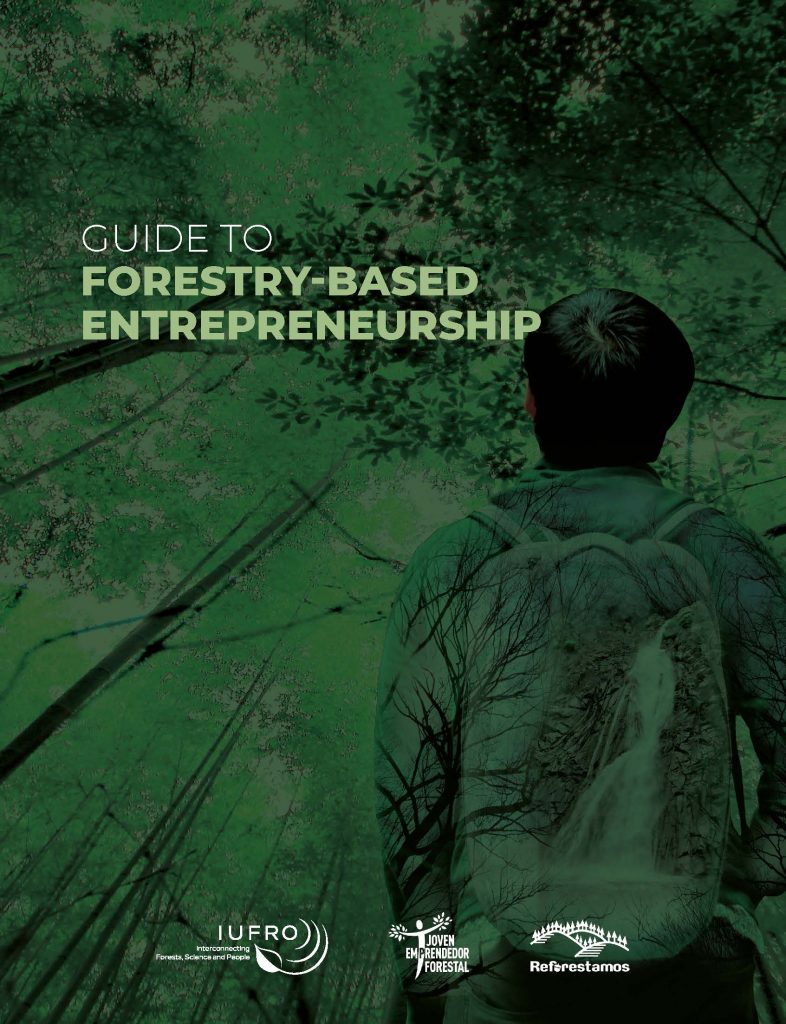Employment and Sustainability in Latin American Forests
Main Objective of Unique Entrepreneurship Guide

IUFRO and the International Forestry Students’ Association (IFSA) – through a Joint IUFRO-IFSA Task Force on Forest Education (JTF) – have joined forces with Reforestamos in developing an ambitious “how-to” forest-based entrepreneurship guide for use throughout Latin America.
Reforestamos is a Mexico-based NGO with a mission to safeguard forest landscapes needed for sustainable development in the region. It has, among other initiatives, supported the creation of small and growing businesses by people living in and from the forests.
The result of the IUFRO-IFSA-Reforestamos collaboration is the Guide to Forestry-Based Entrepreneurship.
José Carlos Martínez Hernández, Director of Innovation at Reforestamos, notes that more than 100 million youths in the region are affected by unemployment. So the importance of strategies and programs to help those young people enter the labor market and find decent jobs cannot be over-emphasized.
By adding entrepreneurial strategies to existing technical knowledge, Reforestamos helps businesses increase their economic, social and environmental impact. And, for the past seven years the NGO has, through its Young Forest Entrepreneur Initiative (YFE), conducted training for 7,000 forestry students in 12 countries. Several of these have been hosted at major IFSA and IUFRO events in collaboration with the IUFRO-IFSA JTF.
“We consider sustainable entrepreneurship as one of the factors that facilitates employment and protects forests,” he said. “We are also working to narrow the gender gap. We want more women participating in the YFE program either as proposer of projects or as teachers actively involved in the training.
“This guide is aimed at students of forestry-related programs. We believe those programs could be strengthened and leveraged by adding social and entrepreneurship topics and courses to their training,” he added.
The NGO supports and is a part of international efforts to integrate the UN Sustainable Development Goals (SDGs) and, from a forestry perspective, ensure more and better managed forests.
The Reforestamos emphasis on entrepreneurship has lined up nicely with work done by the IUFRO-IFSA JTF that also found a need for introducing and-or strengthening business enterprise skills in forest engineering programs.

Prof. Sandra Rodríguez, of the Faculty of Animal Science and Ecology at the Autonomous University of Chihuahua, Mexico, and also IUFRO coordinator for the entrepreneurship guide project, said the collaboration between IUFRO and IFSA has helped them identify some of the gaps, as well as strengths, in forestry education.
“Traditionally, forestry programs focus on the uses and processing of wood. Studies emphasizing the establishment or actual implementation of forestry-based business seem to be missing or marginalized.
“Because of the immense number of goods and services that forests provide, the YFE program offers entrepreneurship training as an option for young forestry professionals and helps fill that training gap.
“This guide, developed through the YFE experience, strives to reach more young people and teachers to promote entrepreneurship as a skill that complements the academic development of future forestry professionals,” she said.
The aim of the YFE program is to ensure that, by 2030, educational forestry programs in Latin America will be training their students so that they may undertake forestry entrepreneurial enterprises in a competent, professional manner.
The guide defines forest enterprise as: the generation of products and services that satisfy society’s needs by means of the sustainable use of forest resources.
In addition, the guide points out that forest enterprise boosts local economies by generating sources of employment. Therefore, it is not only an idea for generating money. The business model specifically promotes social and environmental benefits generated by forests.
Those who use the guide will learn why forest entrepreneurship is important; will see exactly what a forest enterprise is; and will find follow-up steps to take after the enterprise is created.
The guide also elaborates on five tools essential to a successful start-up
- Mapping of the Purpose – defining your passion, team building;
- Detection of Needs – listening, analyzing, understanding the needs of those affected;
- Ideation – generating, developing and communicating new ideas about the use of forest resources;
- Prototype and Validation – designing, testing the proposal;
- Key axes of the Project – detailing the enterprise, highlighting impacts.
Scattered throughout the guide are a series of helpful and informative links that range from information on the SDGs and how a project aligns with them, to connecting the user to information on various aspects of the process from other young foresters who have benefitted from using the step-by-step.
The guide has been implemented in different scenarios at national and international levels and is available in English at: https://www.iufro.org/fileadmin/material/science/task-forces/tf-forest-education/guide_to_forestry-based_entrepreneurship.pdf
Spanish version: https://www.iufro.org/fileadmin/material/science/task-forces/tf-forest-education/Guia-Emprendimiento-Forestal.pdf
View all IUFRO Spotlights at http://www.iufro.org/media/iufro-spotlights/

Leave a Reply